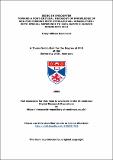Files in this item
Being in encounter : toward a post-critical theology of knowledge of God for persons with intellectual disabilities : with special reference to Karl Barth's 'Church dogmatics' III:2
Item metadata
| dc.contributor.advisor | Davila, James R. | |
| dc.contributor.advisor | Reed, Esther D. | |
| dc.contributor.author | Demmons, Tracy Allison | |
| dc.coverage.spatial | 223 | en |
| dc.date.accessioned | 2009-10-09T13:19:37Z | |
| dc.date.available | 2009-10-09T13:19:37Z | |
| dc.date.issued | 2009 | |
| dc.identifier | uk.bl.ethos.490563 | |
| dc.identifier.uri | https://hdl.handle.net/10023/758 | |
| dc.description.abstract | This study is an exercise in understanding both doctrinally and pastorally the nature of knowledge of God for persons with intellectual disabilities. Its central question is: “How might one know the Word of God without words?” At present, no extended theological systematical consideration has taken place of this question, and confusion arguably exists in the church and wider disability circles as to if/how persons with high support needs, such as intellectual disability, should be afforded pastoral care. This study addresses this need in dialogue with Karl Barth’s theological insights, and by developing an account of knowledge of God for persons with intellectual disabilities that is at once theologically informed and pastorally effective. In the last thirty years theological reflection considered in light of the situation of disability has seen tremendous growth and change, as the discipline has budded and blossomed. In particular, theologians of disability have reflected on the significance of disability in relation to the Christian doctrines of creation, anthropology, Christology, the imago Dei, ecclesiology and eschatology, amongst others, with rich and varied results. Similarly, this project suggests that consideration of the doctrine of revelation and the discipline of pastoral care in light of the situation of intellectual disability will yield unique and valuable outcomes for the disability community, but also for the wider church. Karl Barth will be the primary dialogue partner in these preparatory, theological stages. His thought regarding the incarnation of the Word in various forms, perhaps surprisingly, opens new avenues for our reflection. By engaging Barth’s theological anthropology as well as his theology of co-humanity of being with others in encounter, this project aims to demonstrate that knowledge of God is possible for all persons of all abilities. | en |
| dc.format.extent | 1065297 bytes | |
| dc.format.mimetype | application/pdf | |
| dc.language.iso | en | en |
| dc.publisher | University of St Andrews | |
| dc.subject.lcc | BV4461.D4 | |
| dc.subject.lcsh | God--Knowableness | en |
| dc.subject.lcsh | People with mental disabilities | en |
| dc.subject.lcsh | Church work with people with mental disabilities | en |
| dc.subject.lcsh | Theological anthropology | en |
| dc.subject.lcsh | Barth, Karl, 1886-1968. Kirchliche Dogmatik. Vol. 3.2 | |
| dc.title | Being in encounter : toward a post-critical theology of knowledge of God for persons with intellectual disabilities : with special reference to Karl Barth's 'Church dogmatics' III:2 | en |
| dc.type | Thesis | en |
| dc.type.qualificationlevel | Doctoral | en |
| dc.type.qualificationname | PhD Doctor of Philosophy | en |
| dc.publisher.institution | The University of St Andrews | en |
This item appears in the following Collection(s)
Items in the St Andrews Research Repository are protected by copyright, with all rights reserved, unless otherwise indicated.

